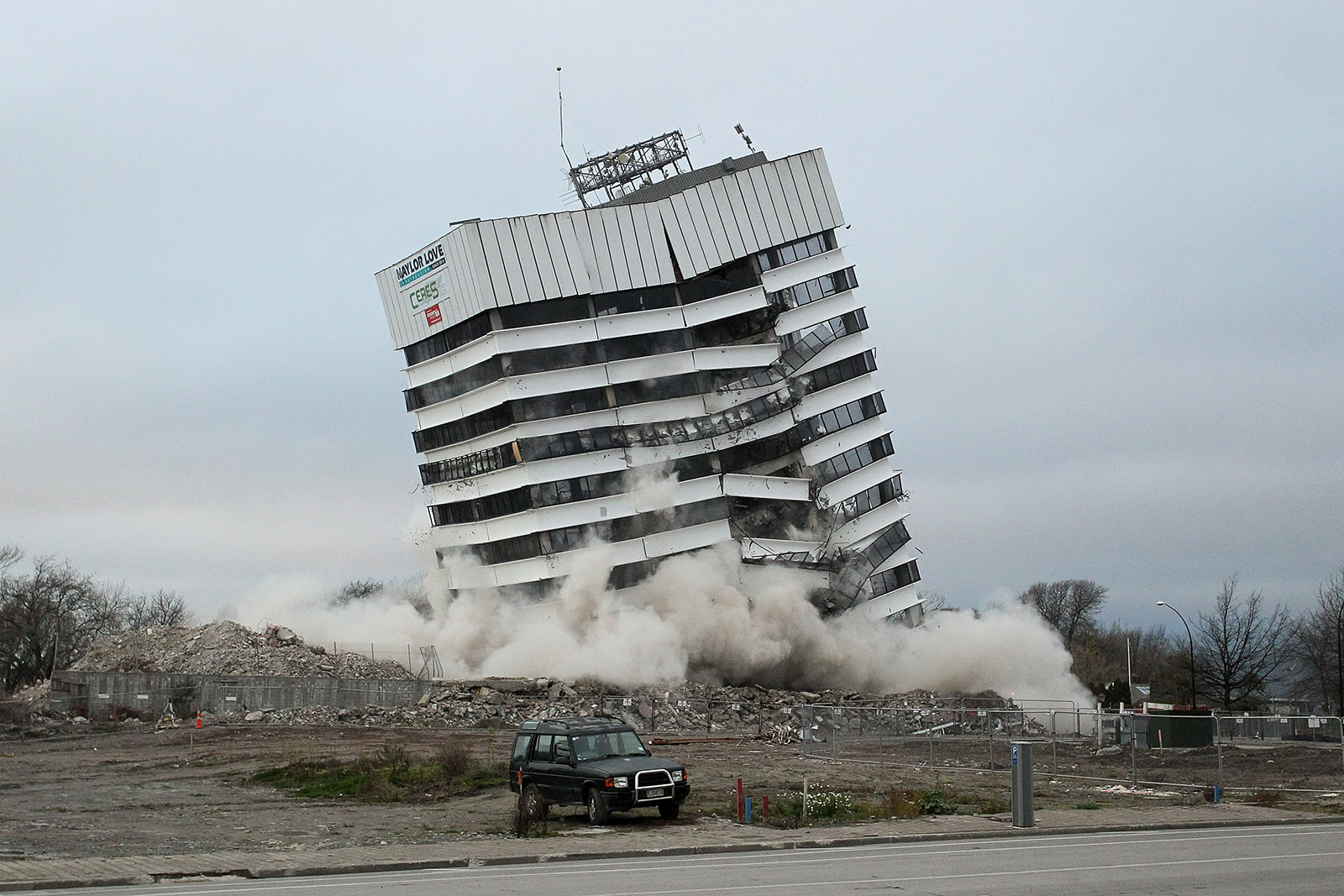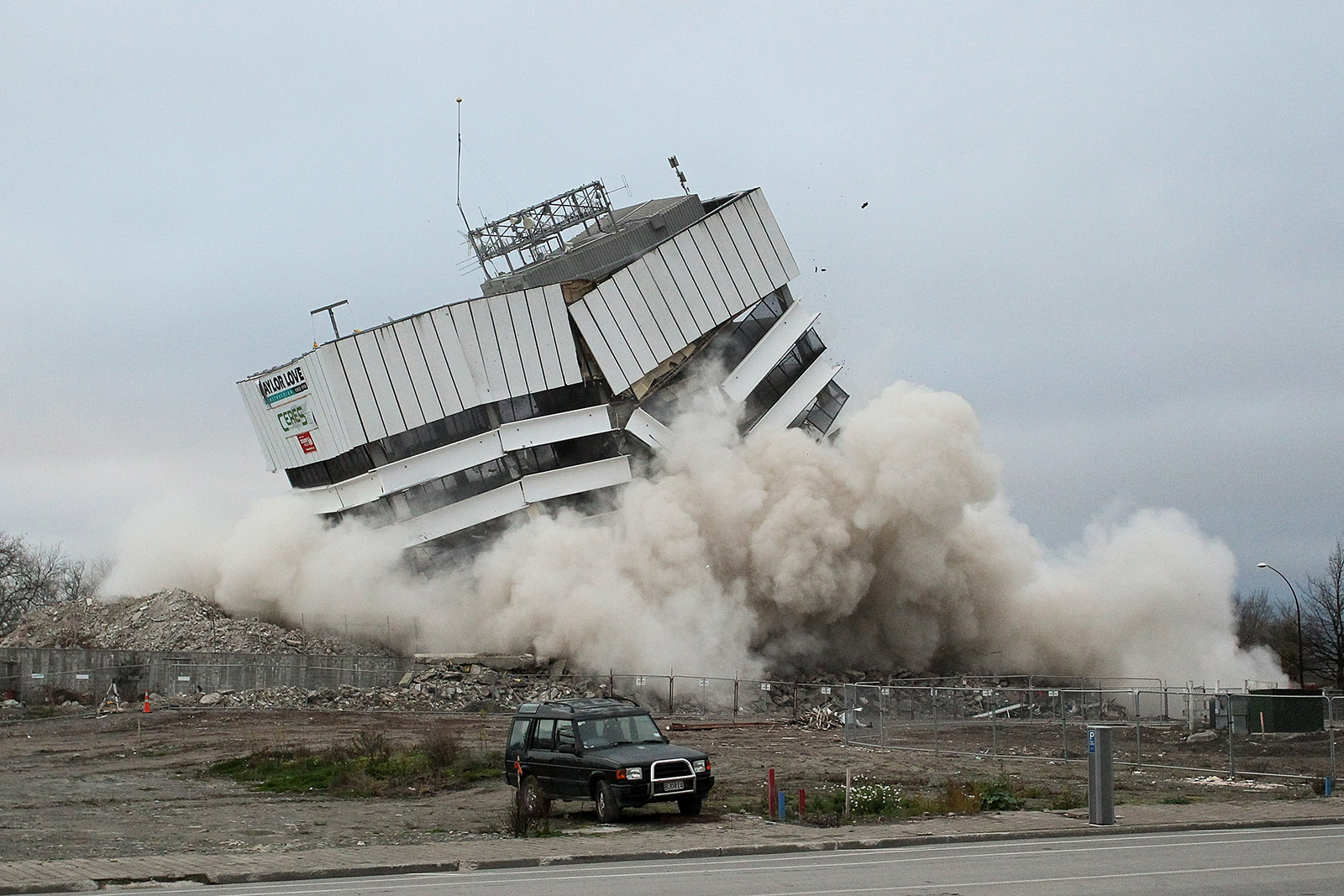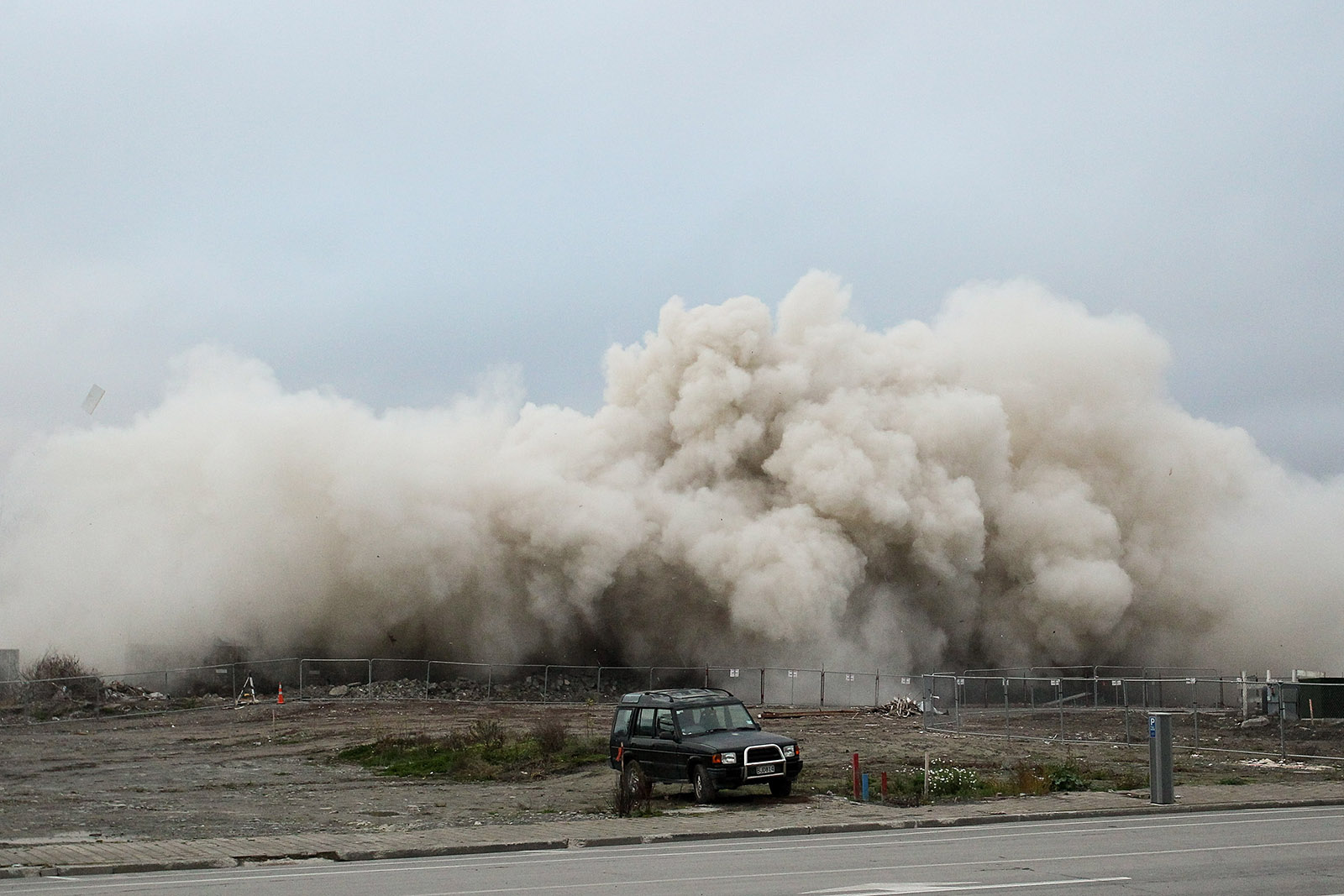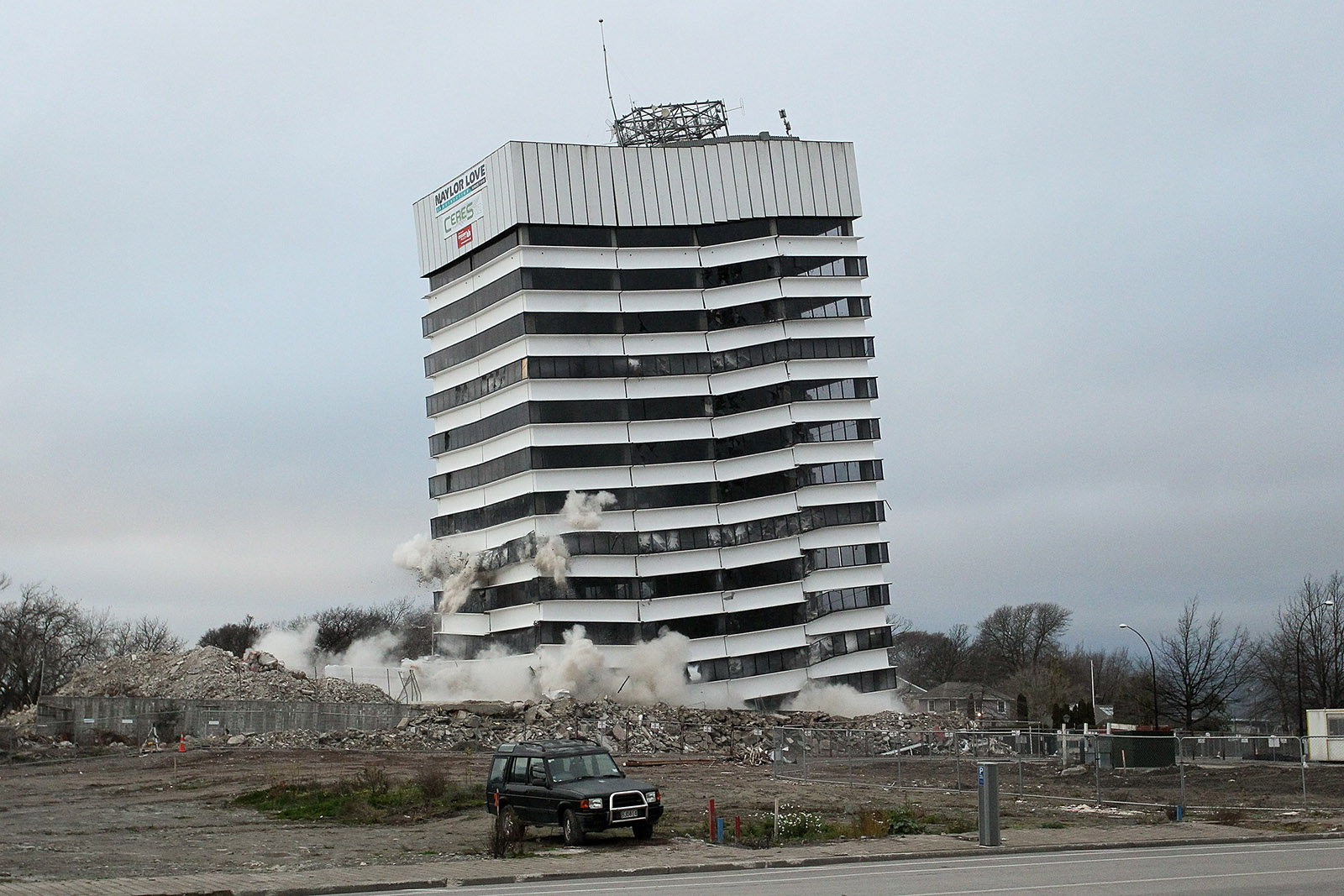Paris—Marco is particularly well-liked among the residents at the retirement home where he works. He attends painstakingly to their every need and discomfort. They confide in him, just as he confides in them. He has painted a collage of bright scenes on the bedroom window of one elderly woman with whom he is particularly close, and with whom he shares a taste in crass humor. As he adds a red rocket ship to the motley tapestry, however, he notices something rustling in the woods down below.
His former co-workers, gone presumably for several days, are carting away the home’s remaining food. When he goes out to stop them, they tell Marco that it’s futile: more supplies will not come, and he’s silly to chain himself to this spot. They tell him where they’re camping that night and that he’s welcome to join. After a moment or two of protest, he goes back inside and tries to pretend as if nothing has changed. But the hopelessness of the situation finally catches up with him. Affixing a respirator to a gas tank unhinged from a utility closet, Marco goes about the thankless task of helping his residents check out early.
So goes the sixth episode of the new French mini-series, L’Effondrement, that premiered this fall on the Canal+ network. Made up of eight stand-alone vignettes, L’Effondrement, or “Collapse,” is set in the near future. This dystopia, as the title suggests, inverts the logic of shows such as the British drama series Black Mirror, which allows viewers to savor their claustrophobic entanglement in a watertight technological apparatus beyond their control. Max Weber’s “iron cage” of modern society’s bureaucratic rationality is not so rigid, L’Effondrement would have us believe. Instead, confronted by the rickety foundations of all we’d taken for granted, we relish the possibility that we might be swept away once everything falls apart.
A global spike in energy prices, frozen industrial supply chains, climate shocks such as crop-destroying heat waves and rapid ecosystem decay—it is not until the series’s final episode, a flashback to the days before the collapse, that we get something of the broader picture. A group of activists, Extinction Rebellion style, have hatched a plot to sneak a rogue climate scientist into a talk show studio where the environment minister is slated to give a reassuring appearance. When the activists rush the stage, the minister graciously allows the scientist to give his rant, after which she dismisses him as an extremist: “You’re a collapsologue!”
For his scruffy beard and frank speaking style, this television scientist is a pretty good stand-in for Pablo Servigne. Disenchanted with the main tenets of conventional environmentalism, Servigne is foremost among a young generation of thinkers, scientists, and activists who call themselves, not without a hint of irony, collapsologues. His first book, the 2015 bestseller co-authored with Raphaël Stevens, Comment tout peut s’effondrer: petit manuel de collapsologie à l’usage des générations présentes (“How everything can collapse: a brief manual of collapsology for present generations”), offered a diagnosis of our “thermal-industrial” civilization and a prognosis of its coming collapse (an English-language edition is forthcoming).
Collapsologie—or, as Servigne and Stevens define it, the “applied and transdisciplinary science of collapse”—proposes to free environmentalist thought from the linear or progressive understanding of history implicit in such faiths as “sustainable development,” “green growth,” or the energy “transition.” The story of human societies, which Servigne and Stevens suggest is ultimately the story of their interactions with their natural environments, is circular. The pendulum of human history swings between moments of our being harmoniously embedded within natural processes and periods of population concentration, political centralization, and an urge to transcend the earth’s resource constraints. We develop economies of scale, agglomerate extractive industry on a grand scale, but ultimately overexploit our natural foundations.
Building off Jared Diamond’s 2005 book Collapse, which focused on these dynamics in primarily pre-modern societies, Servigne and Stevens argue that the same iron law of history applies to our hyper-connected, concentrated, and self-confident industrial society of today. The reasons are manifold—and many will be familiar to readers of recent anglophone environmental bestsellers such as David Wallace-Wells’s The Uninhabitable Earth, arguably a mass-market work of collapsology in its own right.
First, there are what Servigne and Stevens call the earth’s “crossable thresholds.” These concerns make up the majority of what we now think of when we discuss the environmental crisis. These are soft “thresholds” because nothing fundamentally prevents humans from burning the totality of the earth’s stocks of fossil fuels and heating the atmosphere well beyond 1.5 or 2 degrees Celsius—which most scientists now conclude is the red line for averting the worst effects of global warming. That these thresholds are violable does not, however, mean that transgressing them will be any less devastating. As the Intergovernmental Panel on Climate Change’s (IPCC) landmark 2018 study on warming above 1.5 degrees argues, crossing them would spell unquantifiable but devastating damage to biodiversity and the globe’s natural processes, such as oceanic currents. A series of dire feedback loops would kick in: the melting of Arctic permafrost, for example, which would further heat the earth’s atmosphere. What’s worse, many signs suggest that these tipping-points are closer than we previously understood.
Advertisement
What this would all mean in terms of human pain and suffering ought to be enough to make us want to avoid these thresholds at all cost. Heat waves, droughts, and other forms of extreme weather will increase in frequency and severity. Agriculture will become less reliable and suffer declining yields. Rising sea-levels will mean the submersion of many coastal regions. Accustomed to the relatively stable climate that prevailed during the “Holocene,” the geological epoch since the last ice age, our societies will buckle under the new conditions created by our experiment with fossil fuels. Skirmishes, if not outright wars, will result over arable land and dwindling fresh-water reserves, and mass migration from the parched climates around the Equator will provoke nationalist backlashes in the habitable parts of the world. All against a backdrop of raging wildfires. A grim future indeed.
Most discussions of the environmental crisis stop there, however. We then go on to demand an end to fossil-fuel extraction and the redoubling of efforts to convert our economies to renewable forms of energy. Initiatives such as the Green New Deal express a growing sentiment that the private sector will not by itself “transition” its practices, let alone those of our society as a whole, toward a more sustainable energy system. If anything, the opposite is the case: the revelation that oil multinationals such as Exxon Mobile have for decades known of the ruinous effects of greenhouse gas emissions has justified the suspicion that liberal politics-as-usual will not suffice. With good reason, we now talk of the need for a full-scale social “mobilization” of the kind we engaged in to fight World War II.
France’s collapsologues, however, view this all as wishful thinking. Yves Cochet was the environmental minister under Lionel Jospin’s Socialist government in the early 2000s. He has since emerged as one of France’s more high-profile collapsologues, and was a co-founder and president of what might as well be considered the group’s first think tank, the Institut Momentum. Cochet regards the trajectory of traditional environmentalism, with which he was heavily engaged, as largely a “failure.” When I asked him what he thought of the new radical turn embodied by visions such as the Green New Deal, he was circumspect, seeing in them little more than a rehashed and slightly democratized version of the old sustainable development.
“I don’t believe in it for one instant,” he said. Efforts such as the Green New Deal suffer ultimately “from the technological illusion. It’s the Californian technological dream in disguise.”
For Servigne and Stevens, the horizon of sustainable development, a greened industrial society shorn of its addiction to fossil fuels, ignores what they call the earth’s “uncrossable thresholds.” The earth being a closed system, in which a finite quantity of resources is available to a variable population of exploiters (us), poses the inexorable question of limits. Plans to “transition” our energy system from fossil fuels to renewable sources such as wind and solar power, for example, and still assume an exponential expansion in energy use, will not be able to overcome the fact that these new technologies depend on the exploitation of a very limited quantity of rare-earth metals. As the work of Michael Klare, author of The Race for What’s Left, and Guillaume Pitron, author of La guerre des métaux rares, shows, the race to access these resources is rapidly becoming a geopolitical battlefield in its own right. The age of expanding energy exploitation remains the age of fossil fuels.
Ultimately, the critique goes, the fatal weakness of traditional environmentalism is its inability to think beyond economic growth. If the Malthusian anxiety over resource shortages is as old as modern political economy, the collapsologues harken back to the conclusions provided in 1972 for the Club of Rome, The Limits to Growth. That celebrated study, also known as the Meadows Report, predicted that a confluence of resource shortages—among which the most important was the advent of “peak oil”—and a ballooning world population would spell disaster for humanity in the early twenty-first century. The global economy would enter a period of downward stagnation by the 2020s, provoking a precipitous decline in global population in the following decades.
Advertisement
The flippancy with which the collapsologues declare that this future is just around the corner can be quite chilling. “We must prepare small-scale, resilient bio-regions,” Cochet told me, on the scale of only a few thousand inhabitants. Economic circuits must be scaled to local ecosystems and resources, eschewing global supply chains. Visions of the good life that are predicated on unlimited mobility and expanding human wants must be replaced by an ethics of rootedness, the joy of living and working in a defined space. Our assumption of history as an unending process of centralization and unification—toward the universal state—is running up against an ecological wall: “By 2035, the French Republic, the European Union, will not exist.”
*

Declarations of an imminent environmental breakdown are not new, of course. But they have historically been confined to the margins of intellectual and political respectability. Hippie communes sprouted up in the 1970s and 1980s in order to escape an impending nuclear winter, for example. More recently, Internet forums have become a refuge for a budding ecosystem in which survivalists share strategies and words of doctrinal encouragement. The inspiration for documentaries, conferences, art exhibitions, and an endless string of magazine features and op-ed page debates, collapsologie has bucked this trend, emerging as something of a fixture in French intellectual and cultural life. One afternoon in late 2018, I was walking down one of those long corridors common in major Paris metro stations. In the poster slots that line the walls, which usually announce the latest Italian Renaissance master on show at the Grand Palais, were advertisements for Servigne’s 2018 book: “Another End-of-the-World is possible: Living the Collapse (and not just surviving it).”
If a full-scale societal collapse is possible, if not inevitable, what will it be like to live in a world characterized by food shortages, withering natural ecosystems, state failure, and environmental catastrophes? Servigne’s 2018 follow-up to Comment tout peut s’effondrer, co-authored with Raphaël Stevens and Gauthier Chapelle, focuses on the inner life in an age of collapse. Concrete case histories, such as the lingering aftermath of the collapse of the Soviet Union in the 1990s, during which alcoholism, homicide, and adult suicide led to a massive decline in life-expectancy, suggest the need to create what Servigne and colleagues call a “positive” culture of collapse.
Servigne spoke to me of the need to see the coming collapse as intimately related to the place of “spirituality” in liberal, Western culture. “In France,” he regretted, “we consider spirituality to be a private and individual question. What we propose in our book is that in order to make it through the challenges of this century, we’ll have to reconsider our relationship to the earth, which is fundamentally a spiritual issue.” We moderns, they argue, have clung for too long to a negative conception of liberty that shuns notions of moral obligations and interconnectedness. Such an ideal of liberty is the spiritual precondition for our wasteful and decadent industrial system, preventing us from distinguishing our genuine needs from our covetous desires. Moreover, Servigne argues that we crave a new “common story,” a sense of collective meaning that embeds our individual liberty within a higher purpose and an ethos of responsibility vis-à-vis the natural world.
But if one delves into the texts of these writers, and listens to their castigation of the modern world, it’s hard not to get the impression that a lingering form of anticipation—not to say, outright excitement—lies beneath their prophecies of collapse. The collapsologues represent the revival of a strain of Romantic Modernism traceable to a certain reading of Jean-Jacques Rousseau’s historical writings, argued the philosopher Pierre Charbonnier in a critical essay published this past summer in the Revue de Crieur.
Rousseau, of course, writes of history as something of a great forgetting. From our primal embeddedness in nature, when we listened to both our natural liberty and our ingrained inclinations toward benevolence and sobriety, we’ve become the caricatures painted of us by the likes of Thomas Hobbes, as avaricious and inherently violent animals who need taming by the modern state. Servigne and Chapelle’s 2017 book L’Entraide, l’autre loi de la jungle (“Mutual aid, the other law of the jungle”), launches a similar attack against Darwinist and Hobbesian anthropology. “In the jungle,” they write in the book’s introduction, “there reigns a backdrop of mutual aid that we no longer perceive.” Have the promises of human freedom and a meaningful life been betrayed by a bloated and out of scale industrialism? Despite all their clear-headedness on what the worst of global warming could mean in terms of mass human suffering, it’s almost possible to hear the collapsologues saying, “never let a good crisis go to waste.”
The show L’Effondrement is a bit more prosaic. One episode warns that we simply might not be hard-wired for those “bio-resilient,” pastoral communities. A group of refugees fleeing the city happen upon a small rural commune of the kind that have sprouted up around France over recent decades, oases from the organized industrial world where de-growth activists and the country’s thriving alter-globalist community congregate. The commune’s elders deliberate on whether or not to let the new arrivals in. Convinced that they’ll be kicked out and robbed, if not worse, some of the newcomers decide to escape while they can, and take some supplies from the storehouse with them. Their escape is botched. As they rush to hide the murdered body of one of the locals who caught them stealing, they overhear that they’re welcome to stay.
*

The rise of the collapsologues has coincided with a series of critical tests for political environmentalism, in France and around the world. The 2015 Paris Climate Accord provided a global framework for the reduction of fossil-fuel emissions, although many critics argue that its ambitions are too low and will prove insufficient to seriously curtail global warming. The lack of meaningful safeguards, and major nations’ ability to pull out and follow short-term domestic political whims, suggest that it might remain an emissions-reduction agreement on paper only. Each subsequent climate conference has only further revealed the state of international deadlock, as the need to reduce emissions worldwide falls prey to inter-state competition and the clash of interests between developed and developing economies.
In France, only a few weeks after I came across those posters in the Paris metro station, Emmanuel Macron faced the worst political crisis of his presidency. To be sure, his ambition to “make our planet great again” had already suffered a serious setback that summer. Nicholas Hulot, the environment minister and long a popular figure in the French environmental movement, resigned. In his surprise radio announcement, Hulot blamed the power of French special-interest groups in the highest reaches of government, an environmental strategy based on “tiny steps,” and attempts “to revive an economic model that is the cause of all this mess.”
The contradictions that Hulot identified would come into plain sight when Macron’s reform program was brought to a screeching halt in late November and early December 2018 by the Gilets Jaunes revolt, initially sparked by Macron’s attempt to impose a new tax on diesel fuel. Sold as a policy designed to “change the behavior” of French consumers, as Prime Minister Édouard Philippe said, critics saw it as a covert attempt to balance the budget after earlier tax cuts for the country’s wealthiest.
The Gilets Jaunes have since ignited an important debate in France on the pretexts and conditions for genuine environmental reform. Macron’s gas tax has come to stand as a model for “punitive” environmentalism, in a country where it is the working and middle classes that live farthest from city centers with their comprehensive mass transit systems. There is talk of the need for a “popular” ecology, that will reconcile changes to our modern way of life with democratic aspirations and demands. If a society such as France’s is to arrive at carbon-neutrality in the decades to come, what will it mean for the fabric of a society built around the automobile?
The share of carbon emissions for one passenger on a flight from Paris to Nice is equivalent to the annual carbon footprint of the average adult Nigerian, yet a 1944 treaty still exempts global airline companies from paying taxes on gasoline. Do the world’s oil giants deserve hundreds of billions of dollars in annual subsidies? Is it wise to privatize—as Macron’s government is currently doing—the rail network, one of the country’s institutional treasures, at a moment when more collective and sustainable forms of mobility are needed? Did it make sense to build a mega-mall-resort-amusement-park super complex—the highly controversial EuropaCity project—on one of the few remaining patches of undeveloped agricultural land in the Paris region? (That plan was finally abandoned in November, only after much protest.)
What collapsologie in and of itself has to teach us about these questions is unclear, and it is no surprise that the primary critique leveled against the intellectual movement is that it proposes an environmentalism that totally abstains from the messy politics of our democratic societies. One of the common chants of the Gilets Jaunes was indeed “End of the world, end of the month, same struggle,” insisting on how inextricably interwoven economic and environmental justice are. But this slogan also shows that many of our fellow citizens are still preoccupied with such comparatively minor but important matters as paying bills and living decently in the here and now. Also, a good many of us have made a tentative peace with what these collapsologues seem to see as our irredeemably damaged existence in the modern megalopolis, fractured irreparably between our public and private selves. Many of us, perhaps sheepishly, or simply selfishly, quite like the perverted freedoms enabled by a sophisticated division of labor.
The Gilets Jaunes were not in revolt against this. Nor were they in search of a heroic past. They have revolted instead against the fact that the fruits of our filthy industrial apparatus are shared far too unequally. They rebelled against a pseudo-environmentalism that will do little to make the system cleaner, that will not punish the actual polluters, but will do much to make daily life just that bit harder for many more. Thanks to the alliances formed between the Gilets Jaunes and environmentalists, the talk is now of the need to combine these two issues: it will be impossible to clean up our wasteful economy without making sure that the pie it produces is shared equitably.
Of course, where the collapsologues are concerned, it’s by no means a new phenomenon that those who are short on political options will rely on a philosophy of history to fill the void, so that the changes one desires can be said to come about inevitably. I asked Yves Cochet what he had to say about the phenomenon of billionaire survivalists building fortified chalets in New Zealand: Would they, too, face annihilation in the collapse? “There will be no bourgeoisie of the collapse,” he answered. But his confidence that they would be eliminated struck me as unconvincing, if not downright misanthropic.
In one of history’s crueler ironies, and thanks to nothing more than the accidents of geography, the greatest effects of global warming will fall on those societies and regions of the world that have contributed least to the problem—the developing nations of what we now call the “global South.” This is not to say that the societies of the Atlantic world will not be profoundly affected; they will. But given that they did most to create the problem—and are still straitjacketing models of global development in their image—our time would better be spent radically reforming our economic and political systems, rather than imagining the cleansing (and, some might say, genocidal) endgame of our hubris.
Perhaps it makes me even more of a pessimist than Cochet that I fear, through all the coming environmental carnage, the wealthy and powerful could be just fine. A purely cynical, but perhaps accurate, appreciation of our ability to exploit our technological prowess suggests that a gated-community future is all too plausible. In fact, certain precursors of collapsologie take this possibility very seriously, such as Octavia Butler’s beautiful 1993 science-fiction novel The Parable of the Sower. And so long as this remains the case, the lesson to be learned is that it’s too soon to abandon the unsatisfactory and partial project of democratizing society. For all its flaws, mass democracy is still the best system we’ve devised for making living together possible, and a little more dignified. For as long as we can keep it.
As I was reading the work of these writers, I came across a book with no relationship to the environment or global warming, but which I had a hard time not reading as, in some way, a product of, or a needed reflection on, France’s collapsologie moment. As the country was embroiled in the Gilets Jaunes crisis, the philosopher Michaël Foessel, who teaches at the École Polytechnique, read the French press archives from 1938. His book Récidive 1938 is a chronicle of a democracy’s decline, or I should say, “collapse.” In his telling, the wealthy declare their emancipation from society and impose brutal financial austerity. Limited national resources are to be reserved for the French and the French only, as a witch-hunt against refugees, Jews, and other undesirables consumes the country. The police roam the streets. Meanwhile, just about everyone complacently thinks that they have their thumb on the pulse of human history. Some who were so sure of the direction things were headed in—toward a salutary purge of all the injustice in society, clearing the field for us to start over again—didn’t bother to take a look around until it was too late.
That said, all the criticism these writers have taken still sounds like shooting the messenger. The collapsologues do point to real contradictions in contemporary environmentalism. Collapsologie is really just a name for a very serious problem: the frivolousness and injustice of much of what passes for solutions to our current impasse. That some form of mystical antinomianism should emerge from this void recalls the philosopher Michel de Certeau’s saying: “When the political withers, the religious reawakens.”




